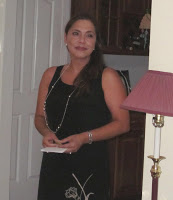Tahirih Justice Center helps immigrant women fleeing gender-based violence
 |
| Olga Sanchez |
Immigrant women in the Annandale area—and throughout Northern Virginia—who are dealing with domestic violence or caught up in human trafficking and don’t know what to do—are finding a helping hand through the Tahirih Justice Center.
Tahirih, based in Falls Church, provides free legal and social services to immigrant women fleeing gender-based violence and seeking asylum in the United States
The organization has served about 12,000 women since it was founded over 14 years ago, says Hedieh Yazdi, who described the organization’s mission and accomplishments at a fundraising event in the Lake Barcroft home of Colleen Coyle last week. More than 800 lawyers in the D.C. area provide pro bono services as part of Tahirih’s legal network.
Coyle described one case she worked on that was similar to the human trafficking ring busted in Annandale a few weeks ago. Coyle, working through Tehirih, helped a group of Korean teenagers, some as young as 14, who were brought to San Francisco to be prostitutes. They had been told they would be maids or students in the U.S., and some of the youngest ones were kidnapped.
Tahirih got visas for them so they could stay and be witnesses to aid the prosecution. “In some cases, they couldn’t go home. They were shamed. Their parents wouldn’t take them back,” Coyle says, so Tahirih arranged for them to stay in U.S. foster homes.
In another case recounted by Coyle, Tahirih helped a women from Afghanistan who was living in Seven Corners and going to George Washington Medical School reject her father’s efforts to marry her off to a mullah who already had four wives. She is now practicing medicine in the United States.
The organization was founded by Layli Miller-Muro who, as a law student in 1997, worked on a case that resulted in a precedent-setting ruling that allowed women to receive asylum on the basis of gender-based persecution. That case involved a Togolese teenager, Fauziya Kassiaja, who had escaped to the United States to avoid genital mutilation and a forced polygamous marriage.
At the Lake Barcroft event, Olga Sanchez bravely recounted her own story of abuse, despair, and ultimately, empowerment.
In 1994, when she had just graduated from school in Bogota, Colombia, got involved in an abusive relationship. “He controlled access to my family, my friends, my salary—everything,” she says. “I was an educated woman with a good job.” But she was afraid to tell anyone about the abuse. “You’re blindfolded; they convince you you’re worth nothing,” she says. That went on for 10 years.
When her daughter was born, Olga decided she couldn’t raise a child in such an unhealthy environment, so she escaped to the United States. Eventually, “I met a man I thought was going to erase that past. I fell in love again,” she recalls, and after seven months of courtship, they got married. Then, “he changed completely,” becoming mentally abusive. He restricted the food she and her daughter were allowed to have, controlled all the money, and wouldn’t give her a key to the house, she says. “It was a nightmare.”
“He never filed for my immigration papers. That’s how he kept me there,” she says. “I had no job, no work permit.” It was only when he hit her daughter, that Olga found the courage to confront him. “He exploded,” striking her so hard, she pulled his tie to make him stop. When the police came, he accused Olga of trying to choke him, and she was arrested.
At the police station, an officer told her about Tehirih, which helped her get a restraining order against her husband. “Tehirih went out of their way to make me feel comfortable,” she says. “They told me I had the right to be respected.” Since those dark days, “things have really changed.” She has a good job as nurse and is able to support her daughter, now 9.
“My story is nothing compared to what my sisters went through,” she says. “Many don’t speak English and don’t know their rights. So many women don’t speak up because they’re afraid of being deported.”
The Tahirih Justice Center was inspired by the Baha’i faith and was named for a women in mid-19th century Persia who was executed for speaking out for women’s rights. Her last recorded words were: “You can kill me as soon as you like, but you will never stop the emancipation of women.”

